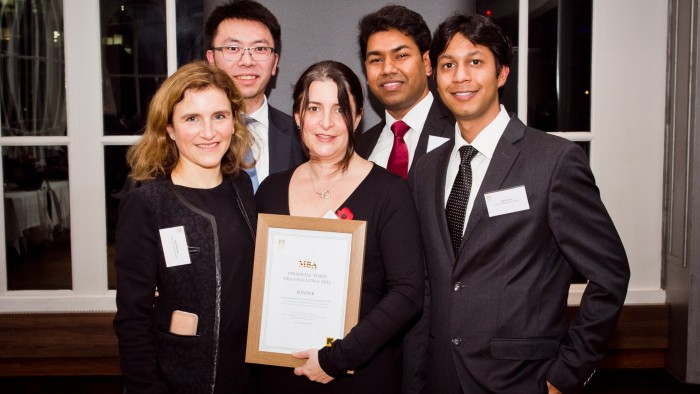Team VIP wins FT MBA Challenge of 2015

Simply sign up to the Business education myFT Digest -- delivered directly to your inbox.
One in five children in Uganda miss being vaccinated against preventable diseases: it is a huge problem but how to address it?
The Financial Times and the International Rescue Committee put the question to business school students and alumni worldwide for this year’s FT MBA Challenge.
Team VIP, or Vaccinate International Programme, with members from HEC Paris, the Indian Institute of Management Bangalore, London Business School and the Alberta School of Business in Canada, came up with the winning formula.
The team’s solution was to use data collected through pregnancy and birth rates to help anticipate the demand for vaccines.
“With this data, it is possible to schedule children in need of vaccination to go to their nearest health centre at a set time,” the group’s business plan said. “Schedules will ensure that the rural populace will get the service they need, while minimising vaccine wastage.”
Team VIP said that gathering the additional data would allow the IRC to create more ambitious “last mile immunisation programmes”, a term to describe the distance to move vaccines from the last-known viable vaccine storage facility to the people that need them.
The eight-member group added: “Our team recommends that a mobile health clinic programme be set up to shorten the distance between villages and immunisation services.”
All the participants in the FT 2015 MBA Challenge had to collaborate remotely over a period of five months and then submit a 12-page proposal to a panel of four judges.
“The win is a reminder that the experiences and skills learnt from for-profit business can also be used in non-profit business to make a positive impact in people’s lives,” Gabriel Wong, the team leader of VIP, said.
His fellow team member Ingrid Marchal-Gérez, an MBA graduate of London Business School, notes: “It’s been very humbling to work with the IRC and bring ideas to improve the impact of their essential work on the ground.”
Justine Landegger, head of immunisation at the IRC, and one of the judges for the challenge, praised team VIP’s work. The group “had a very good understanding of barriers” to immunisation, she said, and that their way of addressing them “is relatively feasible within the scope of the IRC’s work”.
Ms Landegger added: “Matching supply with demand by using data on birth dates and locations is a very efficient way to address access and forecasting. Organising group vaccination times will also decrease vaccine wastage, due to unopened vials, and save money.”
The IRC has been working in Uganda since 1998, focusing on reducing mortality rates for mothers and babies.
In the first year, a pilot project was conducted in the northern part of the country, and this has since supported the implementation of 60 health centres and communities in the five districts of Karamoja, in north-eastern Uganda.
A network of more than 1,700 community health workers has been created. However, more needs to be done to reach the “fifth child”. The programme suffers from a lack of accountability at the national and district level within the Ugandan system.
Improvements could ensure that health centres push and adapt immunisation services into the community, where they are more likely to find under-vaccinated children.
Team VIP’s winning entry also proposed changes to the role of village health teams (VHTs), which Ms Landegger said showed a strong understanding of Ugandan village structure and culture. One idea that particularly impressed the judges focused on using the health teams to communicate messages.
“There is a definite risk that VHTs may not be performing the tasks required in a proper way,” the group’s plan stated. “To encourage quality of work, the IRC may want to consider creating a VHT community newsletter . . . to highlight success stories.”
In their plan, the team proposed a “reward points” programme, whereby VHTs are rewarded with tools and gear that help them do their job, in exchange for compliant behaviour.
Team iVaccinate My Child was runner-up. Jacqui Rowlands, director of global social impact practice at Bain & Company and one of the judges, pointed out that this team’s proposal was “a deserved runner-up because it was simple. It leveraged the existing health infrastructure and community to reach caregivers.”
Pragati Rescue and Shield tied for third place in this year’s challenge. Ms Rowlands found it difficult to split the proposals from the two teams — both incorporated SMS texting to help balance supply and demand. “[Their business plans] included clever ideas to support implementation, such as paper-based immunisation calendars or eRangers,” she said. The standard of the entries for the challenge this year, she added, was “exceptionally high”.
Comments